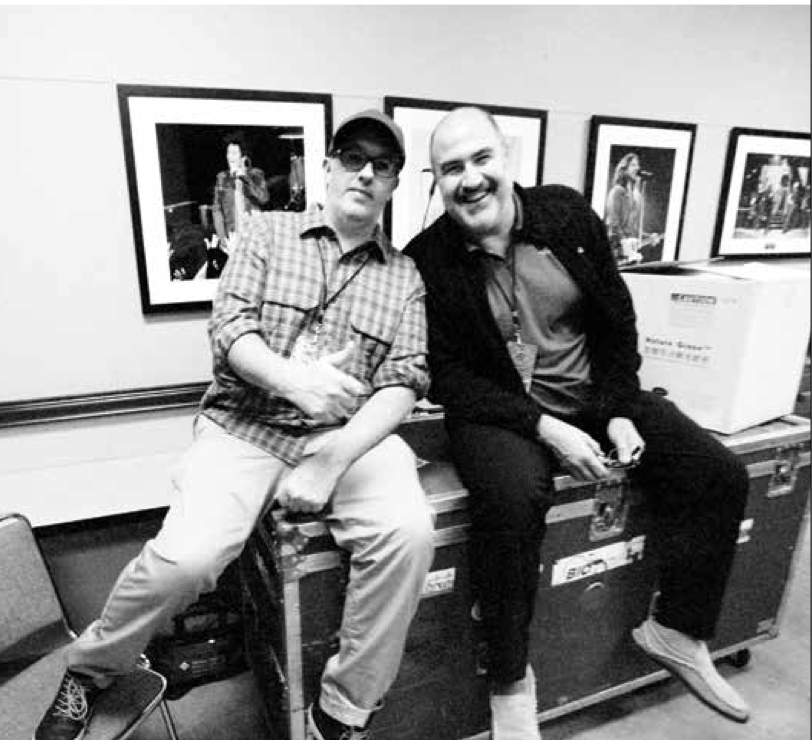Behind the Scene: Patrick Jordan

Red Light Management’s Patrick Jordan serves as manager or co-manager for Phish, Trey Anastasio, Ben Harper, Gogol Bordello, Brandi Carlile and The Bronx/Mariachi El Bronx. He also handles management duties for Dave Matthews Band and is a talent buyer for Starr Hill Presents. As he explains in the debut of our new regular feature, “Behind The Scene,” all of this responsibility makes for some late nights.
What was the live music scene like where you grew up?
I grew up in Wilkes-Barre, Pa., and also went to college there [King’s College]. There was virtually no music scene—lots of bad cover bands—but I still was able to find my way to some great music via friends and my older sisters. In high school, I got turned on to a lot of punk bands that I still listen to like Misfits, Descendents and Dead Kennedys. Same with hip-hop— the golden age of hip-hop was happening when I was in high school, and I consumed every- thing I could get my hands on. When our school would take a field trip to New York City, I remember buying up all the bootlegs on the street corners. Toward the end of high school, I started to really get into the Dead and that was the edge of a musical cliff that would end up with me spending a lot of hours driving to see bands all over the Northeast.
What was your first job in the music business and what led you to that job?
My first paying gig in the music business was as a college rep for BMG Distribution, which owned RCA, Arista, Jive and a bunch of other labels. I got that job from being the music director at my college radio station, WRKC. College radio helped open the door for half the new employees in the music biz at one point in time and, sure enough, a rep from Elektra mentioned that his friend had graduated and was leaving his “alternative” college rep position at BMG, and he would get me an interview. The college rep job included visiting all of the independent record stores in the Philadelphia market, along with setting up promotions at coffee shops and covering shows when bands came to town.
When BMG hired me, I sort of downplayed the fact that I lived two hours from Philly. They were desperate to fill the position and they took a chance on me (which I’m still incredibly grateful about to this day). I then proceeded to drive back and forth to Philly a few days a week, two hours each way. I did this while holding down a full-time school load and a part-time job to pay for my Phish tour habit. I also kept my job at the radio station, although I switched my on-air shift to late night. I don’t think I slept that year but, the day after I graduated college, I got called by a small label owned by BMG called Dedicated Records (Spiritualized, Beth Orton) to come work in the U.S. office they were opening that summer. The pay wasn’t great but I was in the door.
Can you describe your typical day at work?
I wake up later than most, between 9 and 10 a.m., and I usually jump right into work, which is not the healthiest way to start your day but, when you love what you do, it’s not that hard. Some days, I will start with phone calls with artists to help set the priorities for the day while I drink my coffee. I usually work from home until noon, which gives me a chance to be around my family in the daylight hours.
Once I’m at work, I’m usually there until 11 p.m. or 12 a.m. Then, I go home, eat dinner and answer more emails while listening to music. I make it a rule to be in bed and asleep by 3 a.m. Anything later, and I can’t function the next day. Two crucial things I need to survive are six to seven hours of sleep and a shower. This schedule probably reads “extreme” and is not for everyone but since I work with a few West Coast- based artists and agents, it works well for me.
Where are you when one of your artists’ shows is going on?
Last year, I was encouraged by a dear friend and mentor Chip Hooper [Worldwide Head of Music at Paradigm Talent & Literary Agency] to pick up a camera and start documenting shows, travel and my kids. I justified the investment in good equipment because bands always need photos for websites and Facebook, so I figured I would make myself useful while the show is happening. However, I’ve really come to enjoy it. During a show, the mission is generally to find several good vantage points to shoot [from], so I will start in the pit and work all the way up to the last seats in the house, which is a great place to take in the light show. Photography has really helped me gain a different perspective on the show and pay attention to what’s going on onstage and how the audience is reacting to it.
How has your job changed from when you started?
I’m not going to sing some sad song about the Internet. The positive effects that most artists receive from the Internet are unlike anything the music industry has ever experienced, and I focus on creating more positive effects every day. Despite how much the Internet has changed the approach, it’s still a business where your most important work is done on the phone. Personal relationships are at the core of everything in this biz. I also find that so much context is lost in email. It’s a necessary tool but it will never replace getting on the phone or meeting with someone in person.




















